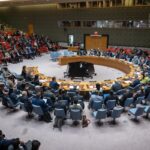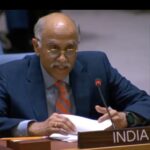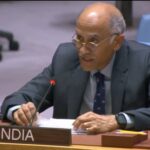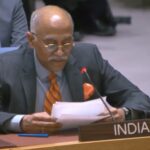India’s Permanent Representative to the United Nations, Ambassador Parvathaneni Harish, has urged the global community to impose a “serious cost” on states that undermine the “spirit of good neighborliness” by supporting “cross-border terrorism.”
Addressing the United Nations Security Council (UNSC) High-Level Open Debate on “Promoting International Peace and Security through Multilateralism and Peaceful Settlement of Disputes,” on July 22, 2025, Ambassador Harish emphasized the importance of the Council’s debate as the UN approaches its 80th anniversary.
Referencing the “gruesome terrorist attack” in Pahalgam, Jammu and Kashmir, on April 22, 2025, which claimed the lives of 26 innocent tourists, Harish noted the subsequent UNSC statement on April 25, in which “members of the Security Council underlined the need to hold perpetrators, organizers, financiers and sponsors of this reprehensible act of terrorism accountable and bring them to justice.”
In response to the attack, he said, India launched Operation Sindoor targeting terrorist camps in Pakistan and Pakistan-occupied Jammu and Kashmir. The military action was “focused, measured, and non-escalatory in nature,” he said adding that hostilities ceased upon achieving primary objectives and at the request of Pakistan.
“There cannot be one standard approach to dispute resolution. The changing circumstances and context also need to be taken into account while considering any such efforts,” added Ambassador Harish. “India, as a responsible actor, and a founding member of the United Nations, has always actively engaged constructively with partners, especially at the United Nations, in collectively working towards a more peaceful, prosperous and just and equitable world.”
Harish highlighted India’s long-standing contributions to international peace and security, noting that India remains the largest cumulative contributor to UN Peacekeeping operations. He also underscored India’s leadership in promoting women in peacekeeping, who have emerged as role models in conflict zones.
Reflecting on the evolution of the UN’s role, the Ambassador said it is “a useful moment to reflect on how far the spirit of multilateralism and peaceful settlement of disputes as enshrined in the UN Charter has been realized,” and to examine the challenges impeding its effectiveness.
He observed that the first four decades of the UN were defined by decolonization and Cold War-era conflict containment, during which the UN played a key role. In recognition of these efforts, UN Peacekeeping forces received the Nobel Peace Prize in 1988. However, the post-Cold War period saw the emergence of new conflicts and shifts in the nature of peacekeeping operations.
“In the recent decades, the nature of conflicts has transformed, with a proliferation of non-state actors, often propped up as proxies by state actors; and cross-border funding, arms trafficking, training of terrorists, and spread of radical ideologies, facilitated by modern digital and communication technologies,” he added.
Ambassador Harish noted that the future of UN peacekeeping is under “serious debate” and that peacebuilding has gained prominence in global discussions. Regional organizations like the African Union have also taken on a more active role in resolving internal disputes.
On the topic of peaceful dispute resolution, he cited Chapter VI of the UN Charter, which emphasizes that it is the “parties to a dispute” who must “first seek a solution through peaceful means of their own choice.” He stressed that national ownership and consent are essential to achieving lasting peace.
He reiterated India’s belief in multilateral cooperation, especially in addressing global challenges such as sustainable development, climate action, disaster resilience, and global health. India, he said, has partnered with the UN through a unique development cooperation initiative and continues to be a first responder in humanitarian crises across the region.
“We are at a time, where there are growing doubts about the multilateral system, especially the United Nations. The serious question marks over the representativeness of the UN Security Council must be addressed urgently,” he added.
He also highlighted India’s role in facilitating the African Union’s inclusion in the G20 during its presidency, calling attention to the persistent deadlock that undermines the UN Security Council’s efficiency and credibility.
Responding to remarks made by Pakistan’s representative, Ambassador Harish stated, “I am also constrained to respond to the remarks made by the representative of Pakistan,” pointing out the contrast in development trajectories within the Indian subcontinent.
He described India as a “mature democracy, a surging economy and a pluralistic and inclusive society,” and contrasted this with Pakistan, which he described as steeped in “fanaticism and terrorism, and a serial borrower” from the IMF.
As the UNSC deliberates on ways to promote peace and security, Ambassador Harish emphasized on adhering to fundamental principles, particularly “zero tolerance for terrorism.” He emphasized that it “ill behoves” a Council member to offer moral lectures while engaging in actions that defy international norms.
He assured the Council of India’s continued commitment to promoting international peace and security through multilateralism and the peaceful settlement of disputes.
Speaking at the Debate, UN Secretary-General António Guterres’ expressed his gratitude to Deputy Prime Minister and Foreign Minister Ishaq Dar and Pakistan for convening the open debate.
“The topic of today’s debate shines a light on the clear connection between international peace and multilateralism,” said Guterres adding “I commend Pakistan for utilizing its presidency to put forward a resolution urging all Member States to make full use of these tools in our collective pursuit of global peace. This is needed now more than ever.”






